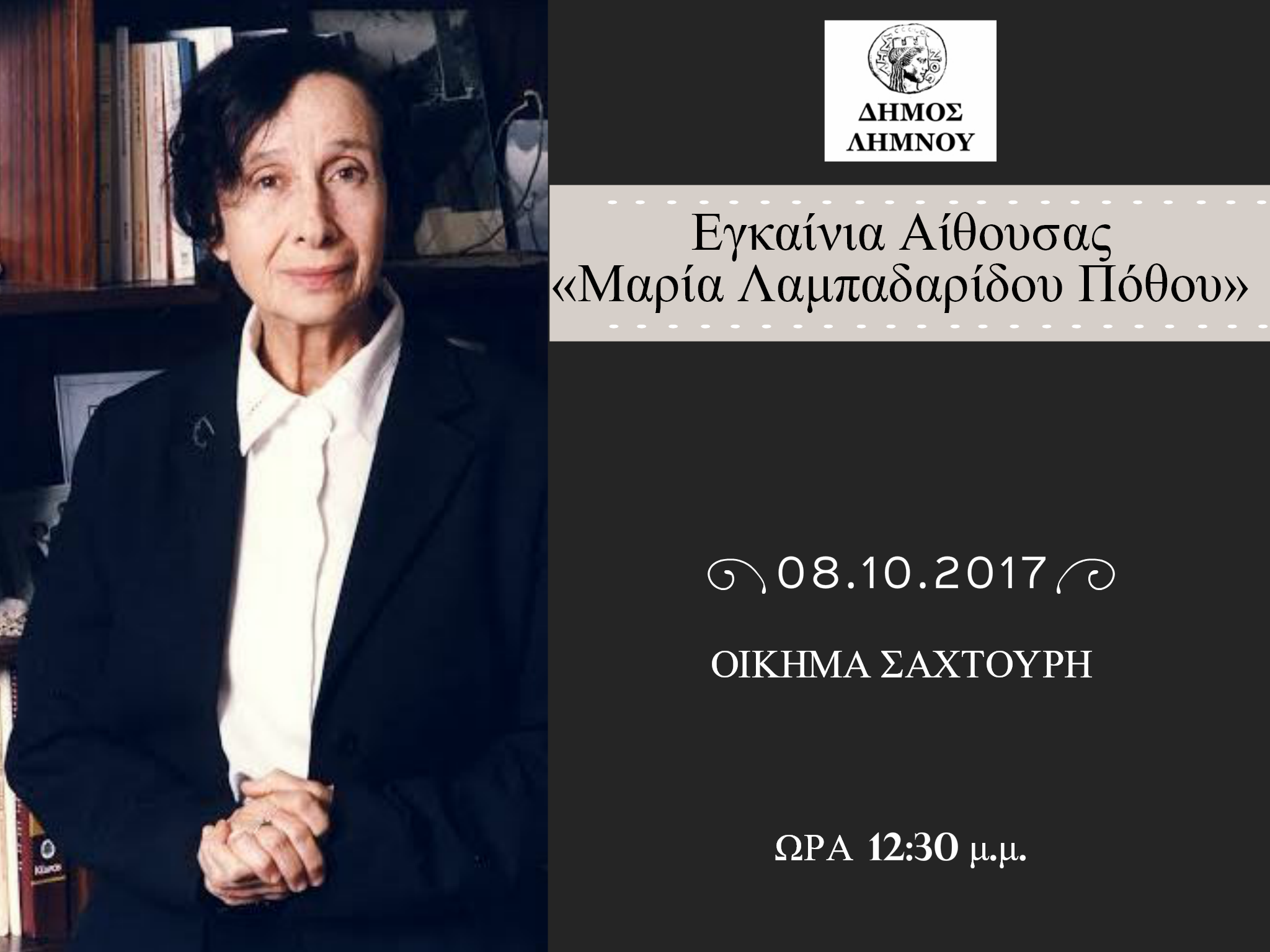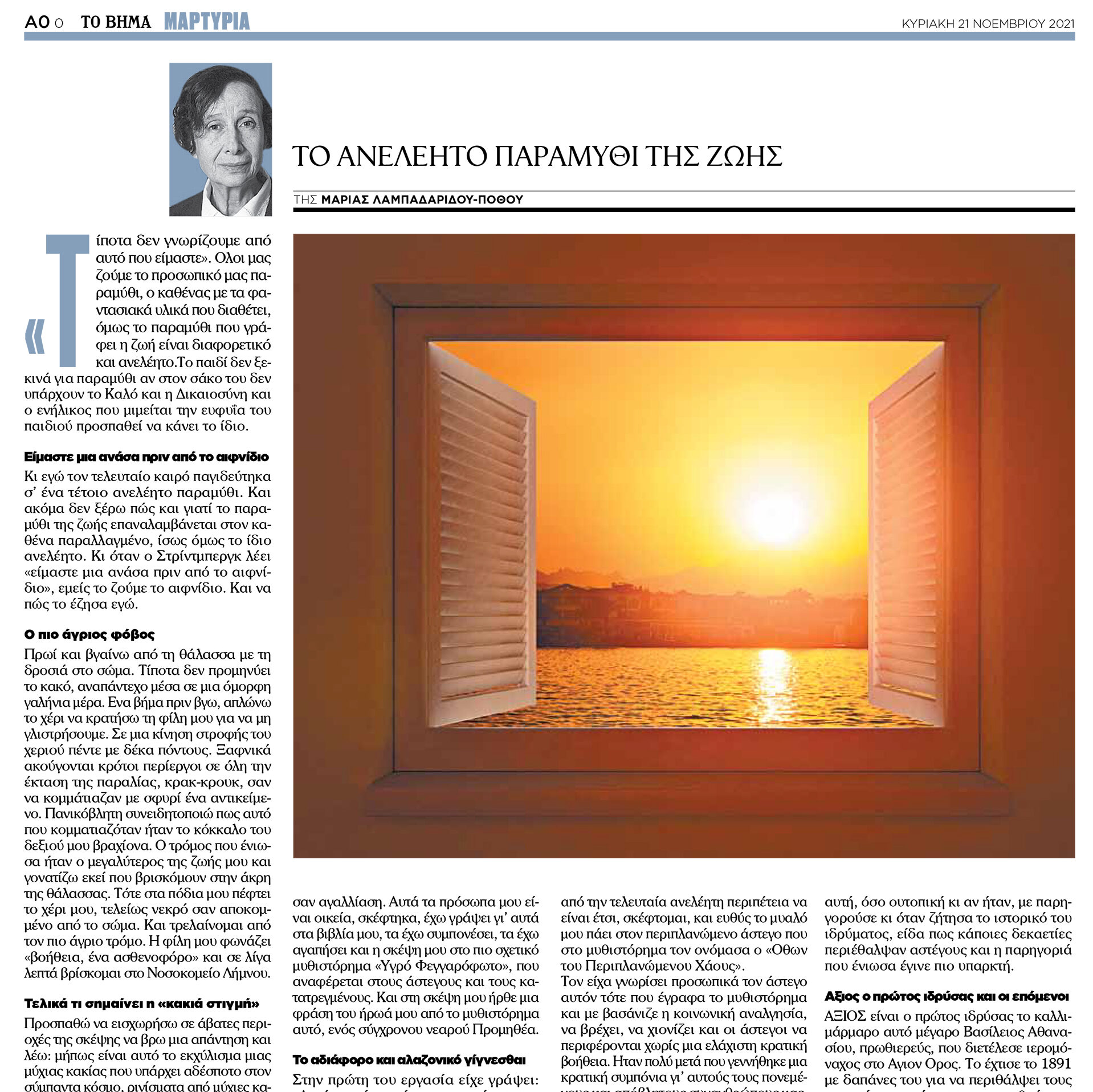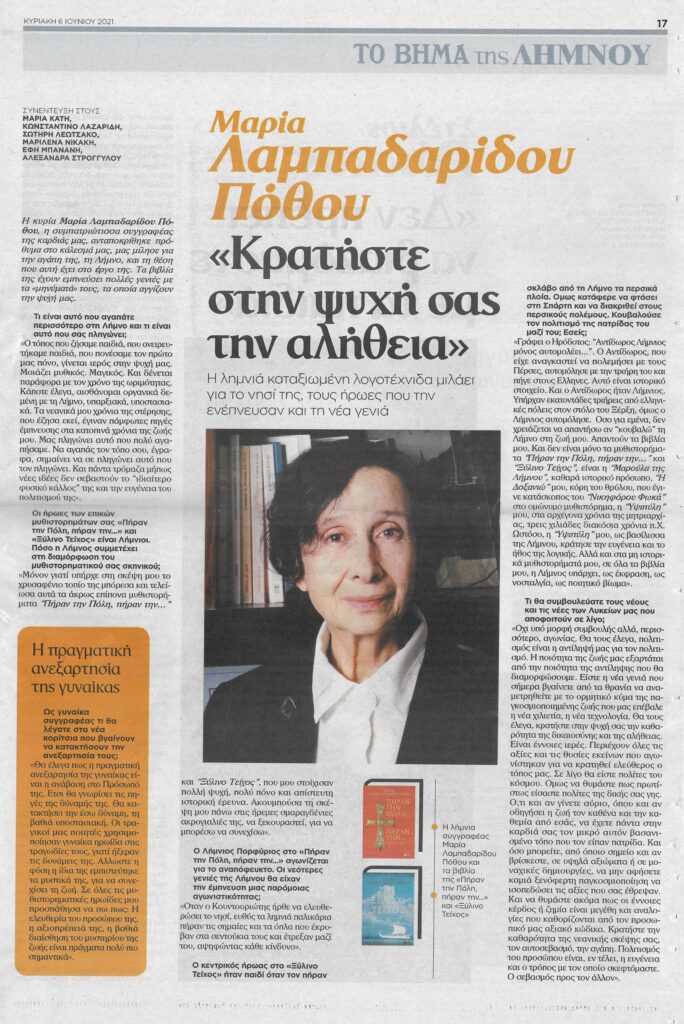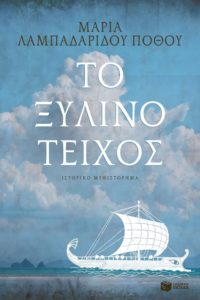2021 rising
History doesn't teach
and neither the mistakes of History
only consciousness can teach
To carry all the blood the cry the mourning
and with footsteps of time
from Ipsilanti and Androutsos and the anonymous
So that they kneel before you those
who loved you deeply
who betrayed you
who glorified you while you were tortured
So you can stand upright ageless and sullen
your youth renovated like an eagle's by
the oaths of the dead
And the Great Day blossoming with Jasmine
Basil and marjoram from Despo's garden
And Time upright beside you
to salute your march from the deep
darkness of slavery
And Papaflessa's charge like raging
wind to bring the cry of the Mother
carrying her newborn dead still on her nipple
and the wailing, Oh, the wailing of the eagles
Bring all these and silence so much silence
so they can be heard!
Because we've had enough of festivities.
And don't ask, Oh, don't ask about the brave ones
those who sacrificed their life
And those who were stabbed on the back
Only the oaths remember
- so they can feel pain, Oh, to feel the pain!
And after, embrace them with affection
speak to them again of love and oaths
that have no price
they will understand.
As for the scene - bring the nights
with those standing guard in the alleys
children laying dead in the backstreets
Bring some of your rivers
with their waters risen against oblivion
to quench the thirst of the hunted
Bring the galloping from the horsemen
the moment they charged like freedom
so that the sound will be alive
for this Holy Day that rises.
Bring the sleepless Souls
with the blood on their hands still alive - never
will the blood of the martyr die
Bring some visions that were never realised
dreams that became darkness and wound
and with all your memories in your arms
with those abandoned expectations
And with Kapodistrias holding the sign - blood
flowing between his bitter eyes:
"Hellas: 2021!"
And don't ask, oh, don't ask - who
let the blood flow
Remember
Only remember.
Written for the Hellenic authors' society collective theme: "Wishes for 2021"
Important events
Readers of Europe reading list - recommendation by the Permanent Representation of Greece to the EU
In 480 BC, Persian king Xerxes invaded Greece with an army whose size was unparalleled in history. Once the 300 heroic Spartans had been defeated at Thermopylae, the road to Athens was wide open, spreading terror and panic across Attica.
According to Herodotus’s narrative, the Athenians turned to the Oracle of Delphi, whose prophecy read: “Though all else shall be taken, Zeus, the all-seeing, grants that the wooden wall only shall not fail.”
Various opinions were offered as to what this ‘wooden wall’ actually meant. Some favoured the option of literally building a wooden wall around the Acropolis. General Themistocles, however, came up with a different interpretation: the wooden wall was a reference to the ships which the Athenians had been swiftly building in the years preceding the Persian advance. Driven by Themistocles’s profound strategic and political genius, the Greek allied fleet triumphed in Salamis after Athens had been burnt, while those who trusted the more conventional verbatim reading of the prophecy suffered the fatal outcome of their decision.
Maria Lampadaridou Pothou’s historical novel The Wooden Wall (Το Ξύλινο Τείχος) offers a fascinating insight into the values, beliefs and fears of the Ancient Greeks. It highlights the importance of enlightened leadership, especially when confronted with hubris, the arrogance that fuelled the Persians’ dreams of dominance. The story is narrated through the eyes of Alcamenes, first a slave and later a free citizen with links to the island of Lemnos, Athens and Sparta, who participates in all three main battles of the Greeks against the Persians in 480-479 BC, standing close to their protagonists.
Throughout history, humankind has been faced with dilemmas as to how to address most effectively major challenges that call into question long-standing norms and well-established routines. The current pandemic, with its massive global socio-economic impact, is definitely one such case, making the oracle of the ‘wooden wall’ all the more relevant. We can draw inspiration from Themistocles, a shining historical example of how visionary thinking, resilience, innovation, openness and inclusion can help overcome the most unfavourable odds. More importantly, Themistocles’s success was predicated on the values of democracy and social participation, which were born in Ancient Greece and constitute the foundation of our European Union; it is these values which ensure the buy-in and ownership necessary for societies to come together in times of crisis. ‘The Wooden Wall’ offers inspiration in these trying times and reminds us of the timeless value of democratic principles.
Ancient Greek literary works need no introduction. But modern Greek literature has also produced several masterpieces, not least the works of two Nobel Prize laureates – Giorgos Seferis and Odysseas Elytis. Discover more Greek literature in Eureka, the online catalogue of the Council libraries.
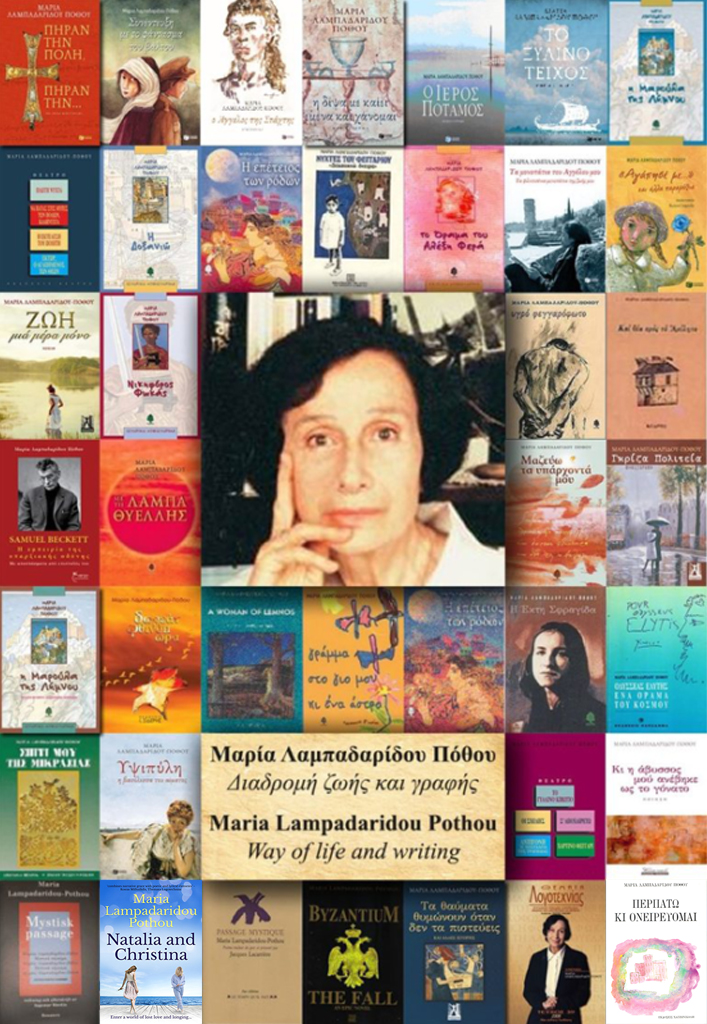 Golden writing: a beacon of Greek Literature
Golden writing: a beacon of Greek Literature
Interview to professor Dimitra Chalazia, for the magazine "Knowledge travels.. in Greek" published in Switzerland:
I met Maria Lambadaridou Pothou, however strange it may seem, through the writings of Jacques Lacarrière. The French Hellenist, through deep analysis of her work and praising her poetic and "initiated" writing, moved me ... so I run to the first bookstore I found and bought one of her books.
Since then, I follow her work faithfully and always look forward to her next writing endeavor. What was the impact in her life from the journey from Lemnos, her birthplace, to Athens and from there to Paris? What does she think about the situation in the country? What messages does she send us? An unfolding of thoughts and reflections of a Greek woman, an enlightened woman who loves and aches for her home country. You will get to know the renowned, award-winning Greek author through the following interview as well as through the article Lemnos in a memory trip.
You were born and raised in Lemnos. Did you go to Athens chasing a dream?
The evermoving time of our life is a journey into the dream, I say somewhere in "Paths of my angel". But this "dream" goes a long way. Lemnos, with its "special natural beauty", was a lonely island at that time, as if it was forgotten on the map. I was young. Thirsty for knowledge. Anxious to make this intangible dream come true: To write books. I still didn't know what I wanted to write - not even a single bookstore on the island. But I knew: One day I would write. After all, life matures you faster and more properly through deprivation. And I thought that some things in life are fated. So the roads opened one by one and brought me to the sources of incredible knowledge, a degree in Greece, a scholarship from the French government for theater studies at the Sorbonne, books that were being published, awards. And all were done with endless toil, with endless anxiety. I also mention this in my biographical book "Paths of my angel" which are pages from my diaries.
What did your birthplace give you that you carried with you, in your luggage?
Love. It gave me this brilliant love, which I passed on all the books I wrote, and everything I did in my life. When I left I didn't know yet how deeply I loved my home. Slowly, I realized that this bond was an organic, substantive relationship. It came in the nights through my dreams wherever I was, in Athens, in Paris, when I was studying. It was my old house coming to me as if it was following me wherever I went, it had become a symbol now, a metaphysical soul, coming with its stone steps and reminding me my "root", perhaps not the root of my ephemeral life's memory but the root of existence, of the unknown path from the cosmogenic depths of time. Then I realized that a place is not the soil and stones but a soul alive throughout the centuries. And I knew then that Lemnos, through its own mystic paths, was repaying my love for it. Even if everyone can say that this is not real at all.
In your website you mention among other things: “I write because this is the only way for me to exist”. Since when did you realise and accepted the fact that Poetry and writing was your path;
There is no “moment” that I realized. It has always been within me. Like breathing. Much later I realized that some things are as if you always knew them, as if you were given them because that knowledge is within you and guides you. Knowledge or intuition, inner vision, insight, initiation into yourself. Slowly you conquer all these since you are attracted to them at first. And to ascend yourself is not at all painless. Self-knowledge is not painless. Even the light you seek to express in it is not without pain. Or to cancel the dark part of your journey. This is how you walk in initiation and with insight into the great truths. This is how I marched towards this "Invisible" that exists beyond the visible, what is a more solid and more attractive reality that even seems uncertain or even impossible. And now that I'm on the edge of time, I can only say that this is what I was interested in passing in my novels: The invisible world and how it dominates our cognitive reality.
What did your meeting and later on your correspondence with Samuel Beckett offered you;
Some things in our lives may not be accidental. They may be what we call "destined". For some reason that, with our lacking perception, we will never understand. Elytis wrote in a letter to Andreas Embirikos that "what others perceive as random events we know them as messages from the unknown." I was on a scholarship in France when I saw Samuel Beckett's play "Happy Days" with Madeleine Renault at the Odeon Theater in Paris and I was shocked. I wrote him a letter straight away and asked to translate the play. I conveyed to him what his work meant to me and how I approached its symbolism. I didn't keep copies of my letters then, and I don't remember exactly what I wrote to him. It was the beginning of a long correspondence. Today I think that he, with his insightful look, saw in my thoughts what interested him: The prenatal memory of his theatrical characters and time moving vertically to an unknown reality. Years later I dared to send him a small play when he asked for it. It was "The Glass Box". He wrote straight away telling me that he liked it and that he sent it to director Jean-Louis Barrault. I have already written a book about his work, "Samuel Beckett - The experience of existential grief". At that time the French writer and Hellenist Jacques Lacarrière had sent me a foreword because he found in this book the philosophy of the Gnostics and because it was a different perspective on Beckett's work. What can I say today? Both my correspondence with him and my personal acquaintance when I met him in his apartment on St. Jacob's Avenue were one of the most important things in my life.
Your books have great power, I believe, in helping to cultivate the individual, forming ideas as well as consciousness. Is that what you are looking for?
My goal has always been: To enrich and enlighten my own soul. My own perception. And to reach the purity of my own consciousness. But today I feel that this is precisely why the books I wrote were loved. Because what we write is true only when it comes out of the truth of our soul.
Your historical novels, such as "The City has been taken" have more life and less history. Are you more interested in human existence? Why?
History is an abstract terrain. Or, abstract concept. To write a proper historical novel you have to bring this abstract concept of history to life. A dialectic of passion. To give the sacrifice and the oath and the blood. That is, to make the collective concept of history personal. To give it through the singular cry, from a singular consciousness - as I write In my historical novel "The City has been taken", which is currently being republished by Patakis Publications on a new journey, after twenty years and twenty-two republications. I remember, in the four years I was writing it, I was trying to forget historical events so that I could participate with my body and soul in the thrilling events of the besieged Capital. I would go and sit for hours in the muted and dark Agia-Sofia and that was more important than history. Because there I could experience the vibration from the echoes.
In your works, memory always returns. Is this to encourage us to look often into the past?
The past belongs to the present time. The past is shaping the present. And if we look at time from this perspective, then we can tap into memory. We can realize the power and the authority that the past has in our lives. T. S. Eliot says:
Present time and past time
perhaps both are present in future time
Can literature be a form of resistance to authority?
Literature, genuine literature, even when it speaks of metaphysical or existential anxieties, is an act of resistance. It becomes an act of resistance. What rescued the ancient world is neither the political speeches nor the historical texts. It is the great poetry of our Tragedians. That poetry preserved the magnitude of our character's culture. It saved the values. The statehood structure unto a level of values. The concept of "human measure" (Herodote). And when we consider modern times, poetry has always been awakening people to seek righteousness.
What book would you recommend for someone who hasn't read any of your work to start with? Also, which ones are translated?
Usually, the reader starts with the book that will accidentally fall into his hands. And if he likes it, he will look for others. Then he can realize what is right for him. Some readers are fanatical about my novel "The Angel of Ashes". Others about the historical ones. Some have read only the book "Letter to my son and a star" and that was enough. It had been broadcasted by NRT radio and was loved very much, I have half a chest full of letters for this book. As for the translations of my books, we know that the Greek language is a huge part of our culture, but it has also provided the "infrastructure" on the value scale of many cultures, yet it does not cease to be isolated due to the difficulty of translation. Only a few of my books have been translated. One is the poetry collection "Passage Mystique" released by the French publishing house "Le Temps qu'il Fait" translated by Jacques Lacarrière with a preface of his own. The same poetry translated into Swedish was released in Stockholm by BONNIERS publishing house. A book consisted of three theatrical plays and poetry was released by Guernica publications, in Canada, titled "A Woman of Lemnos" and edited by University professor Rhoda Kaufman. From my novels, only the book "Natalia and Christina" is currently available online from Amazon. A few more novels have been translated. I hope that at some point they will find the right publisher.
What is the smallest Greek thing you have loved most?
Anything genuinely Greek. And there are no sizes in love either. A sunset, the Akathist Hymn or Elytis's poetry.
Finally, we would like you to send a message to our readers who love Greece deeply and are sorry for what has happened to us in recent years.
Once I wrote a novel titled "The Sixth Seal", which is based on the writings of Apocalypse. Its legend: Some people, with the lucrative mania of tourist exploitation, tried to destroy a small place where sacred rituals took place in the old days. And since my heroine couldn't save this place from disaster, then the place used its own mystic forces and defended itself. This is how I feel about our wounded country. Or this is what I need to believe. Since we cannot save it, our country itself will regain its primordial powers. As long as there is a volume of Plato or Aristotle or our Tragic Poets in the university libraries of the world, and as long as Greek culture is the value structure of every civilized country, Greece will remain untouched by the trials imposed on it by these unfortunate circumstances. I always said that we, as a people, are only its ephemeral face. Greece itself, as a destiny, is not a part of our ephemerality and, I believe, this is how it will keep moving in time eternal. Or - again - this is what I need to believe. Because, culture is not what we were given. Culture is our perception of culture. And maybe that is where today's depravity comes from.
To love Greece means we must respect it first.
Δημοσιεύτηκε τον Φεβρουάριο 2017, "Knowledge travels.. in Greek" με θέμα: Η δική μου Ελλάδα – Πάντα επιστρέφω

